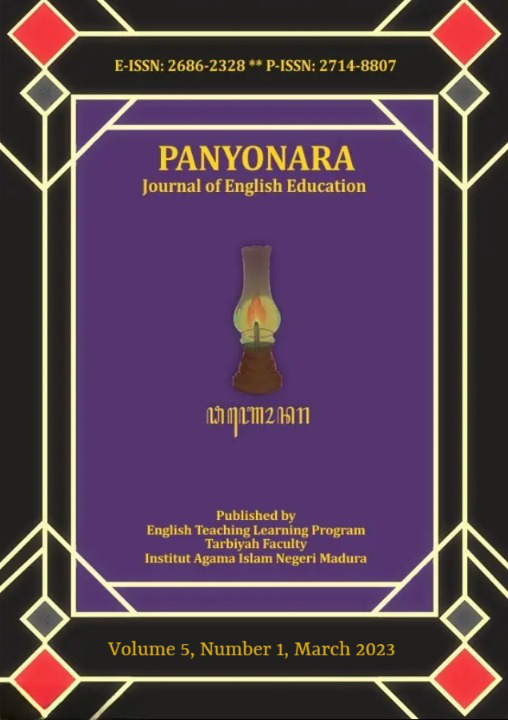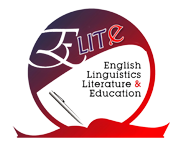EFL Students' Perception on Webtoon: Reading Activity
 Abstract views: 755
,
Abstract views: 755
,
 PDF downloads: 961
PDF downloads: 961
Abstract
Nowadays, the digital era offers many creative platforms to help EFL students gain more English knowledge and comprehend all English skills, particularly reading. Leisure reading, like Webtoon, is the most popular platform for practicing reading among millennials. Webtoon is a digital comic with a colorful design and various stories for readers to enjoy. Nowadays, the digital era provides many creative platforms to assist EFL students in gaining more knowledge in English to comprehend all English skills, especially in reading. The most platform for practicing reading millennials use is leisure reading, such as Webtoon. Webtoon is a digital comic with a colorful design and has many kinds of stories that eager readers to read. Therefore, this research seeks to determine EFL students' perceptions of both state and private universities about Webtoon on reading activity. This study was a quantitative research design. The data were gathered through questionnaires distributed to the students. The result revealed a positive perception of the students toward using Webtoon as reading reactivity.
Downloads
References
Al Falaq, J. S., Suprayogi, S., Susanto, F. N., & Husna, A. U. (2021). Exploring the Potentials of Wattpad For Literature Class. Indonesian Journal of Learning Studies, 1(2), 98-105. Retrieved from https://dmi-journals.org/ijls/article/view/50
Ali, A., & Razali, A. (2019). A Review of Studies on Cognitive and Metacognitive Reading Strategies in Teaching Reading Comprehension for ESL/EFL Learners. English Language Teaching, 12(6), 94. https://doi.org/10.5539/elt.v12n6p94
Asmara, R. (2018). The Implementation of Extensive Reading Using Line Webtoon to Enhance Students’ Reading Comprehension in Narrative Story. RETAIN: Research on English Language Teaching in Indonesia, 9(2), 75-82.
Aulia, R., & Zainil, Y. (2020). An Analysis of Students’ Reading Motivation in English Subject at Junior High School. Journal of English Language, 9(1), 358-367. https://doi.org/10.24036/jelt.v9i1.108288
Erya, W., & Pustika, R. (2021). Students’ Perception Towards the Use of Webtoon to Improve Reading Comprehension Skill. Journal of English Language Teaching and Learning (JELTL), 2(1), 51-56. https://doi.org/10.33365/jeltl.v2i1.762
Fitri, E., & Ulsi Q. (2016). A Study on Flouting Maxims in Divergent Novel. TEKNOSASTIK: Jurnal Bahasa dan Sastra, 14(1), 32-40. https://doi.org/10.33365/ts.v14i1.84
Gürleyik, S., & Akdemir, E. (2018). Guiding Curriculum Development: Student Perceptions for the Second Language Learning in Technology-Enhanced Learning Environments. Journal of Education and Training Studies, 6(4), 131-138. https://doi.org/10.11114/jets.v6i4.2994
Indah, D., & Wibowo, H. (2021). An Analysis of Reading Literacy for College Students Through Webtoon As Interactive Learning. LINGUA: Jurnal Bahasa dan Sastra, 17(1), 53-66. http://dx.doi.org/10.34005/lingua.v17i1.1367
Jansen, A. (2019). Increasing Leisure Reading among University Students Using E-readers with Audio. College & Research Libraries, 80(3), 356–365. doi:10.5860/crl.80.3.356
Katemba, C., & Sinuhaji, G. (2021). Can ESA Method Through Games Enhance Vocabulary knowledge?. International Journal of Game-Based Learning (IJGBL), 11(3). DOI: 10.4018/IJGBL.2021070102
Katemba, C. V. (2021). Enhancing Vocabulary Performance Through Mobile-Assisted Language Learning at Rural School in Indonesia. Acuity: Journal of English Language Pedagogy, Literature and Culture, 6(1), 1-11. DOI: 10.35974/acuity.v6i1.2457
Katemba, C. V. (2022). Vocabulary Enhancement through Multimedia Learning Among Grade 7th EFL Students. MEXTESOL Journal, 46(1), 1-13.
Katemba, C. V. (2019). Students’ Vocabulary Enhancement at Grade 10: A Comparative Study Using CALL & MALL in Indonesia. CALL-EJ, 20(1), 87-114. http://callej.org/journal/20-1/Katemba2019.pdf
Kim, J., & Yu, J. (2019). Platformizing Webtoons: The Impact on Creative and Digital Labor in South Korea. Social Media + Society, 5(4), 1-11, 205630511988017. https://doi.org/10.1177/2056305119880174
Kusumawati, A. J. (2019). Students’ Perception on SQ3R Method in Reading Comprehension with the Help of Technology. Proceedings of the 2019 5th International Conference on Education and Training Technologies, 120–124. New York, NY, USA: ACM. https://doi.org/10.1145/3337682.3337705
Manalu, B. H. (2019). Students’ Perception of Digital Texts Reading: A Case Study at the English Education Department of Universitas Kristen Indonesia. JET (Journal of English Teaching), 5(3), 191-203. https://doi.org/10.33541/jet.v5i3.1312
Mitra, M., & Keziah, M. (2019). Advantages of Using Comics Pedagogy in English Language Teaching-A Practical Approach. Pramana Research Journal, 9(6), 1441- 1451.
Novanti, E., & Suprayogi, S. (2021). Webtoon’s Potentials to Enhance EFL Students’ Vocabulary. Journal of Research on Language Education (JoRLE), 2(2), 83–87. https://ejurnal.teknokrat.ac.id/index.php/JoRLE/index
Nurjanah, R. L. (2018). The Analysis on Students’ Difficulties in Doing Reading Comprehension Final Test. Metathesis: Journal of English Language Literature And Teaching, 2(2), 253–264. https://doi.org/10.31002/metathesis
Prahastiwi, I., & Kamil, A. (2023). The Use Line Webtoon in Extensive Reading Activity for Students’ Motivation. PROJECT: Professional Journal of English Education, 6(1), 47-51. https://journal.ikipsiliwangi.ac.id/index.php/project/article/view/12180/pdf
Prayudha, J. S. (2021). Students’ Problems Face in Online Learning Amids Pandemic. Acitya: Journal of Teaching & Education, 3(2), 188-197. Retrieved from https://journals.umkt.ac.id/index.php/acitya/article/view/2197/889
Rahmat, N., Rahman, S., & Rahmah, H. (2018). Exploring Reading Issues Among Millennials and GenZ. European Journal of English Language Teaching, 4(2), 112-124. https://doi.org/10.5281/zenodo.2430189
Shehu, I. (2015). Reading Comprehension Problems Encountered by Foreign Language Students, Case Study: Albania, Croatia. Academic Journal of Interdisciplinary Studies MCSER Publishing, 4(1), 91-96. https://doi.org/10.5901/ajis.2015.v4n1s1p91
Siyabi, M. S. (2017). Integrating True Short Stories into English Classes: The Case of Foundation Students in Oman. English Language Teaching, 10(3), 164-170. https://doi.org/10.5539/elt.v10n3p164
Supplemental Material for Gender Differences in Reading and Writing Achievement: Evidence From the National Assessment of Educational Progress (NAEP). (2019). American Psychologist, 74(4), 455-488. https://doi.org/10.1037/amp0000356.supp
Yuliani, S., & Purnama Sari, R. M. (2022). Webtoon Short Story in English Online Class: Students’ Perception. Education and Humanities Research, 624, 134-141 Retrieved from https://www.webtoons.com/en/genre
The journal uses an Open Access policy under a Creative Commons Attribution-NonCommercial 4.0 International License. Authors who publish with this journal agree to the following terms:
- Authors retain copyright and grant the journal right of first publication with the work simultaneously licensed under a Creative Commons Attribution License that allows others to share the work with an acknowledgment of the work's authorship and initial publication in this journal.
- Authors are able to enter into separate, additional contractual arrangements for the non-exclusive distribution of the journal's published version of the work (e.g., post it to an institutional repository or publish it in a book), with an acknowledgment of its initial publication in this journal.
- Authors are permitted and encouraged to post their work online (e.g., in institutional repositories or on their website) prior to and during the submission process, as it can lead to productive exchanges, as well as earlier and greater citation of published work.
















